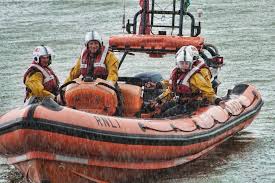
A campaign's been launched to halve the number of people accidentally dying around the UK's coastline over the next decade.
New figures from the RNLI show 163 people were killed in 2014. Almost three-quarters were men, and well over half didn't mean to enter the water, either. Kinghorn RNLI launched 39 times last year, making 38 rescues.
Coastal fatality figures released today by the Royal National Lifeboat Institution show 24 people lost their lives around Scotland's coast last year, but two-thirds didn’t even set out to enter the water. The number of near-misses was even higher, with the RNLI’s lifeboat crews in Scotland saving 51 lives 2 in 2014.
The charity's 2015 national drowning prevention campaign, Respect the Water, is warning people that our coastlines and waters can be dangerously unpredictable. The RNLI is releasing two hard-hitting campaign films, which will be shown in cinemas across the UK and Ireland from tomorrow.
The five-year figures show an average of 35 people die around Scotland’s coast each year. Of the 174 people who died over the past five years, over half were taking part in activities like walking, running, climbing and boating and were, therefore, unlikely to have intended to be in the water. Slips and falls while walking and running contributed to the most coastal deaths in Scotland, accounting for 24%.
Commercial use of the water accounted for 14%; swimming, jumping in and general leisure use 9%, and the specialist activities of diving and angling accounted for 13% and 6% of the fatalities respectively.
Men are far more prone to getting into danger at the coast than women. Almost three-quarters of the deaths over the five-year period were men 3. Last year, a staggering 92% of those who died were men.
The RNLI is aiming to halve the number of coastal deaths by 2024. The charity’s national drowning prevention campaign, Respect the Water, is this year warning people, particularly adult men, to be aware of the dangers of the coastline, as well as the water itself.
Michael Avril, RNLI Community Incident Reduction Manager for Scotland, said: ‘Most people heading for a stroll or run along the coastline probably wouldn’t consider a drowning prevention campaign like this relevant to them as they have no plans at all to enter the water. We’re warning people that if they’re going near the water, whatever their activity, they could be at risk and they need to take care. Unexpected dangers like slippery rocks, sudden waves or unstable ground can catch anyone out.’
An experienced climber severely injured in a fall from cliffs backed the new campaign. Peter Stephenson, 53, warned, ‘My life-changing experience does illustrate that it doesn’t matter how experienced you may be, how familiar you may be with the coastline, that anything can happen.’
The charity is also warning people of the unpredictability of the water, including the dangers of cold water and rip currents. Summer air temperatures may be warm but the average UK sea temperature is just 12oc. Cold water shock, which causes uncontrollable gasping and numbs the limbs, can set in at any temperature below 15oc.
Rips are strong currents of water which can quickly drag people out of their depth. They account for around two-thirds of the environmental-related incidents RNLI lifeguards respond to each year. For those not at a lifeguarded beach, being caught in a rip can prove fatal if they don’t take the right steps to free themselves and make it safely to shore.
Michael Avril added: ‘The water might look inviting, but it can be dangerously unpredictable, with hazards which can be fatal if not respected. Cold water is a major risk for anyone who ends up in the water, intentionally or otherwise. The body’s reaction to sudden immersion in cold water will trigger uncontrollable gasping, which can draw water into the lungs and lead to drowning. The coldness will also gradually shut down the use of limbs, making it very difficult even for strong swimmers to stay afloat.
‘Currents under the surface can overwhelm even the strongest swimmers. They can drag people out of their depth so quickly, and if you try to swim against them you’ll become exhausted.
‘We want people to enjoy the water but to make sure they respect it. Around 35 lives are lost around Scotland’s coast each year but many of these losses could be avoided if people acknowledge the dangers and follow some basic safety advice.’


 9°C
9°C
 10°C
10°C